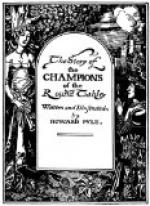[Sidenote: The Lady Helen findeth the King] When they came to that place of open rocks above told of, they found King Ban lying very quiet and still upon the ground and with a countenance of great peace. For I believe of a surety that God had forgiven him all his sins, and he would now suffer no more because of the cares and the troubles of this life. Thus Queen Helen found him, and finding him she made no moan or outcry of any kind, only she looked for a long while into his dead face, which she could see very plainly now, because that the dawn had already broken. And by and by she said: “Dear Lord, thou art at this time in a happier case than I.” And by and by she said to Foliot: “Go and bring his horse to this place, that we may bear him hence.” “Lady,” said Foliot, “it is not good for you to be left here alone.” “Foliot,” said the Queen, “thou dost not know how much alone I am; thy leaving me here cannot make me more alone.” Therewith she fell to weeping with great passion.
Then Foliot wept also in great measure and, still weeping like rain, he went away and left her. When he came again with King Ban’s horse the sun had risen and all the birds were singing with great jubilation and everything was so blithe and gay that no one could have believed that care and trouble could dwell in a world that was so beautiful.
[Sidenote: The Lady Helen bringeth her dead down from the Mountain] So Queen Helen and Foliot lifted the dead king to his horse and then the Queen said: “Come thou, Foliot, at thine own gait, and I will go ahead and seek my child, for I have yet Launcelot to be my joy. Haply he will be needing me at this moment.” So the Queen made haste down the steep hill ahead of Foliot and by and by she came to the margin of that little lake where they had rested awhile since.
By now the sun had risen very strong and warm so that all the lake, and the meadows circumadjacent, and the forest that stood around about that meadow were illumined with the glory of his effulgence.
Now as Queen Helen entered that meadow she beheld that a very wonderful lady was there, and this lady bare the child Launcelot in her arms. And the lady sang to Launcelot, and the young child looked up into her face and laughed and set his hand against her cheek. All this Queen Helen beheld; and she likewise beheld that the lady was of a very extraordinary appearance, being clad altogether in green that glistered and shone with a wonderful brightness. And she beheld that around the neck of the lady was a necklace of gold, inset with opal stones and emeralds; and she perceived that the lady’s face was like ivory—very white and clear—and that her eyes, which were very bright, shone like jewels set into ivory. And she saw that the lady was very wonderfully beautiful, so that the beholder, looking upon her, felt a manner of fear—for that lady was Fay.
(And that lady was the Lady of the Lake, spoken of aforetime in the Book of King Arthur, wherein it is told how she aided King Arthur to obtain that wonderful, famous sword yclept Excalibur, and how she aided Sir Pellias, the Gentle Knight, in the time of his extremity, and took him into the lake with her. Also divers other things concerning her are told of therein.)




